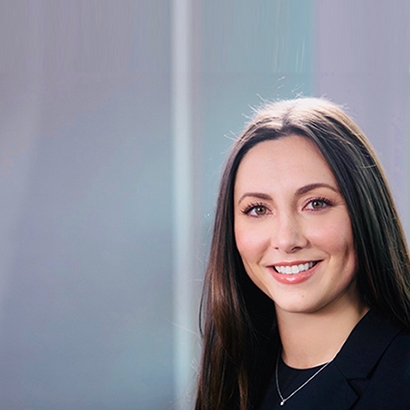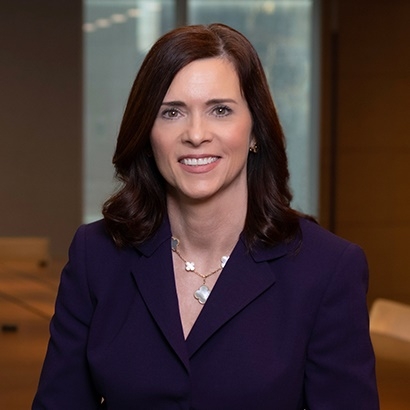Financial Advisor and Morgan Stanley MAKER Gail Covington, a musician growing up, learned a discipline she uses today to help clients, and women, expand their vision of themselves.
Morgan Stanley’s Gail Covington was born during the Civil Rights Movement, “a time of turmoil” in the Bay Area, where she grew up. She remembers the photo of Black educator and activist Angela Davis hanging on their living-room wall and the Vietnam War protesters on the streets of Berkeley. Still, she looks back on “an amazing upbringing. I am so blessed to have been the child of Ben and Shirley Covington, whose story is so important to mine.”
As part of the Great Migration in the 1950s, they left the South for the Oakland Bay area. “Their journey was about opportunity and instilling core values, including education and work ethic, into the four of us,” says Gail of her siblings.
Her childhood focused on school and extracurricular activities, which would help shape the person she’d become. She was a Girl Scout, and her mother, a teacher, was always the cookie mother, their garage stacked full of cookie boxes. Her father, an avid outdoorsman, led their family vacations at lakes and streams across the state. “I was casting for trout and salmon by the time I was 7!”
The sound of opportunity
Music became one of the most defining parts of her childhood. “I owe that to my mom, a classically trained pianist,” she says. “We spent lots of time in the car, eating Twinkies on our way to lessons.” Gail remembers the way her mother always spoke with them during those rides. “It was almost as if I could visualize opportunities passing through the air, and my job was to capture them.”
By the time she was in third grade, Gail had played five different instruments, from the piano to the violin, her favorite. “When I was 11, my mom sought out a highly regarded teacher and convinced her to take me on as a student,” says Gail. “She was strict and insisted we all play in orchestras and compete in music festivals.”
That rigor taught Gail what it meant to truly commit to something and “strengthened my approach to not only music but academics.” Today, that focus and discipline helps her “show up for our clients, ready to do the very best job possible.”
Having toured frequently with orchestras, even performing for the Queen of England, Gail has many lifelong friends who she met through music. Today, she extends her commitment to music and the arts as an active member of the boards of the San Francisco Symphony Board of Governors and the East Bay Center for the Performing Arts.
“The arts are where you find the soul of a community,” she says. “Without the arts, our lives would be significantly less rich—in the way we think and approach ideas and in the vibrancy with which we express ourselves.”
Gail points to another instance when her mother was a fierce advocate. The public schools in Oakland had gotten so crowded that they were combining grades five and six. On Gail’s first day of sixth grade, her mother insisted Gail be moved. Shirley took her fight to the superintendent but lost. She kept Gail home then enrolled her in an independent school.
“As a 12-year-old, I had to be courageous in leaving my friends and attending a school that was significantly more difficult,” says Gail. “But it was an important lesson in advocacy and one of the best things that happened in my education.”
Her father was just as influential. Ben left home at 15 and became a bricklayer to provide for his family. But he went on to college and became a surgeon then chief of surgery at a hospital in Oakland. “A highlight of my childhood was doing the rounds with him on weekends,” says Gail, who, at age 8, asked if she could watch him perform surgery. “I will never forget his honoring that wish, letting me scrub and suit up to observe a gallbladder operation.”
After that, she wanted to follow in his footsteps and be a physician. But in high school, she took a class about the stock market with her father, who was always talking about “preparing for your future and these things called stocks, mutual funds and compounding interest,” she says.
Gail chose to study at Williams College, a small liberal arts school in Massachusetts, where she earned a bachelor’s in economics and political science. She worked for three years in banking at Goldman Sachs before heading to Harvard Business School, where she earned her MBA. She remained in banking for several more years before making the shift to wealth management and starting her practice, The Covington Wealth Management Group, in Northern California.
Advocate for oneself
As a banker, she remembers doing the work and keeping her head down, hoping “they don't realize how much I really don't know” but that “my good work will speak for itself.” Now, she works hard to lead women out of that mindset. “We need to stop thinking, ‘I’m too young, I don’t have anything to contribute, and I have to wait to be noticed to be promoted.’” Rather, she now advises, women must “lift one’s voice, have a perspective and advocate for oneself.”
Besides her commitment to mentoring diverse women, Gail is known for her passion for visionary projects. She was an early pioneer in Workplace Wealth, serving as a Financial Advisor to the employees of many technology companies. In 2020, Gail joined Morgan Stanley’s Access One Alliance, a cohort of 10 senior African-American Financial Advisors who collectively manage $10 billion in assets for institutional, ultra-high-net-worth and family-office clients. Gail was instrumental in its creation and launch and now sits on its steering committee.
In 2022, she was named a Morgan Stanley MAKER—joining a distinguished group of women and men, all nominated by their peers for serving as advocates, groundbreakers and innovators for women’s advancement. She calls it an honor to be recognized with others for “transforming cultures, leading with our voices, lifting other women and being their fierce advocates,” much like her mother was for her.
A favorite part of her job, she says, is “helping clients expand their vision of who they thought they could be. When a client can think about things other than financial assets and instead focus on the actual living of one’s life, ensuring the future for their children and their grandchildren, I've done my job right.”



